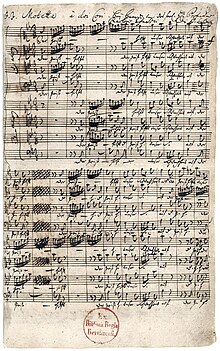Johann Heinrich Ernesti

Johann Heinrich Ernesti (12 March 1652 – 16 October 1729) was a Saxon philosopher, Lutheran theologian, Latin classicist and poet. He was rector of the Thomasschule, and Professor of Poetry at Leipzig University. He gained fame through his writings on Cicero.
Life[edit]
Ernesti was born in Königsfeld,[1] the son of the preacher Daniel Ernesti.[2] He received his first lessons from his father, who was a Königsfeld rector. Later, he attended high school in Altenburg under his cousin Jacob Daniel Ernesti. From 1670, he studied theology and philosophy at the University of Leipzig, where he became Baccalaureus in 1672, and in 1674 Master of Philosophy.
In 1680 he was appointed as an assessor at the Faculty of Arts of the University.[2] Furthermore, he worked until 1682 as a Saturday preacher at the Church of St. Nicholas. He was conrector (vice-principal) from 1680 and from 1684 to 1729 rector (principal) of the Thomasschule, succeeding Jacob Thomasius.[3] He introduced a new education policy, including allowing school prayer in German. He served for 45 years, the longest term of office of all known principals. His successor was the influential Johann Matthias Gesner.
From 1691 Ernesti was professor of poetry at the University of Leipzig. He taught about Roman poets Horace, Ovid, Juvenal and Virgil and also more recent Latin writers such as Helius Eobanus Hessus. Ernesti himself was active as a writer, his output included panegyrics. His most important work was 14 Selectarum Orationum Liber (Marcus Tullius Cicero).[4]

When composer Johann Sebastian Bach applied for the post of cantor (choirmaster) in 1723, Ernesti was the rector of the school.[5]
Ernesti died on 16 October 1729 in Leipzig. For the memorial service for Ernesti's death held on 21 October 1729 in the Paulinerkirche, the university church, Bach composed the motet Der Geist hilft unser Schwachheit auf, BWV 226.[3]
Works[edit]
- Centuria evangeliorum ad usum scholasticum exactorum, 1687.
- De usu profanarum litterarum in interpretandis scripturis sacris, 1688.
- De usu sacrarum litterarum in interpretandis scriptoribus profanis, 1689.
- Dissert. acad. de pharisaeismis in libris profanorum scriptorum occurrentibus, 1690.
- De orationibus in libris N. T. historicis, 1692.
- De Regulo, 1694.
- Historiae rerum sacrarum et profanarum parallelae, 1694–96.
- Cornelius Nepos per epistolas scribens, 1698.
- Misnia Romana, 1698.
- Compendium hermoneuticae profanae s. de legendis scriptoribus profanis praecepta nonnulla, 1699.
- Commentatio, 1700.
- Orationes de professoribus oratoriis, 1702.
- De prof. ethicis, 1702.
- De professoribus poeticis, 1702.
- De prof. dialecticis et logicis, 1703.
- De sportula Romanorum quotidiana, 1703.
- ὈρνιθογραΦία Ovidiana, 1705.
- Commentationes novae in Cornelium Nepotem. Justinum, Terentium, Plautum, Curtium et poesim barbaricam, 1707/38.
- Commentatio in res philosophicas seculares, 1709.
- Paralipomena, 1711.
- Historia rerum Lipsicarum metrica, 1712.
- Observationes poeticae de genere carminum didactico et versu rhythmico, 1714.
- Usurpata a Curtio in particulis latinitas, 1719.
- De latente in fabulis poeticis divina veritate, 1722.
- Accedunt Praefatio et Indices. Bearbeitungen von Gottlob Benedikt von Schirach, Buchhandlung des Waisenhauses, Halle 1746.
- 14 Selectarum Orationum Liber. Buchhandlung des Waisenhauses, Halle 1822.
References[edit]
- ^ Johann Georg Theodor Grässe, Lehrbuch einer allgemeinen Literärgeschichte aller bekannten Völker der Welt: Bd. 1, Arnoldische Buchhandlung, 1853, p. 964.
- ^ a b Spitta, Philipp (1899). Johann Sebastian Bach: his work and influence on the music of Germany, 1685-1750. Novello and company, limited. p. 200. Retrieved 26 October 2012.
- ^ a b Buelow, George J. (2004). A History of Baroque Music. Indiana University Press. p. 539. ISBN 978-0-253-34365-9. Retrieved 26 October 2012.
- ^ Flood, John L. (1 September 2006). Poets laureate in the Holy Roman Empire: a bio-bibliographical handbook. Walter de Gruyter. ISBN 978-3-11-018100-5. Retrieved 26 October 2012.
- ^ Forkel, Johann Nikolaus (1920). Johann Sebastian Bach: His Life, Art, and Work. Harcourt, Brace and Howe. p. 39. Retrieved 26 October 2012.
Bibliography[edit]
- Leontsky, Jan. Bach against Ernesti, the strange quarrel. (Essay in French). Tarnhelm Ed. 2011.
External links[edit]
- Literature by and about Johann Heinrich Ernesti in the German National Library catalogue
- 17th-century German philosophers
- 18th-century German philosophers
- German Lutheran theologians
- 17th-century German Protestant theologians
- 18th-century German Protestant theologians
- German poets
- 1652 births
- 1729 deaths
- Academic staff of Leipzig University
- Leipzig University alumni
- 17th-century writers in Latin
- 18th-century writers in Latin
- 17th-century philosophers
- 18th-century philosophers
- Lutheran philosophers
- German male poets
- 17th-century German writers
- 18th-century German writers
- German male non-fiction writers
- 18th-century German male writers
- 17th-century German male writers
